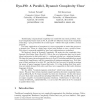Free Online Productivity Tools
i2Speak
i2Symbol
i2OCR
iTex2Img
iWeb2Print
iWeb2Shot
i2Type
iPdf2Split
iPdf2Merge
i2Bopomofo
i2Arabic
i2Style
i2Image
i2PDF
iLatex2Rtf
Sci2ools
156
click to vote
PODS
1994
ACM
1994
ACM
Dyn-FO: A Parallel, Dynamic Complexity Class
Traditionally, computational complexity has considered only static problems. Classical Complexity Classes such as NC, P, and NP are de ned in terms of the complexity of checking { upon presentation of an entire input { whether the input satis es a certain property. For many applications of computers it is more appropriate to model the process as a dynamic one. There is a fairly large object being worked on over a period of time. The object is repeatedly modi ed by users and computations are performed. We develop a theory of Dynamic Complexity. We study the new complexity class, Dynamic First-Order Logic (Dyn-FO). This is the set of properties that can be maintained and queried in rst-order logic, i.e. relational calculus, on a relational database. We show thatmany interestingpropertiesare in Dyn-FO including multiplication, graph connectivity, bipartiteness, and the computation of minimum spanning trees. Note that none of these problems is in static FO, and this fact has been used to ...
Related Content
| Added | 10 Aug 2010 |
| Updated | 10 Aug 2010 |
| Type | Conference |
| Year | 1994 |
| Where | PODS |
| Authors | Sushant Patnaik, Neil Immerman |
Comments (0)

